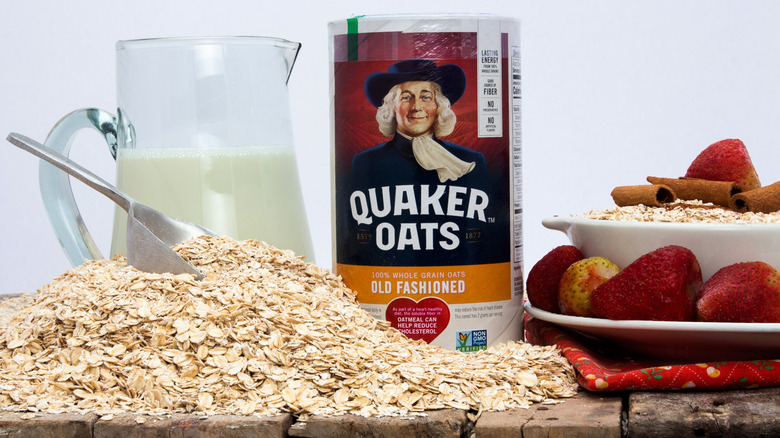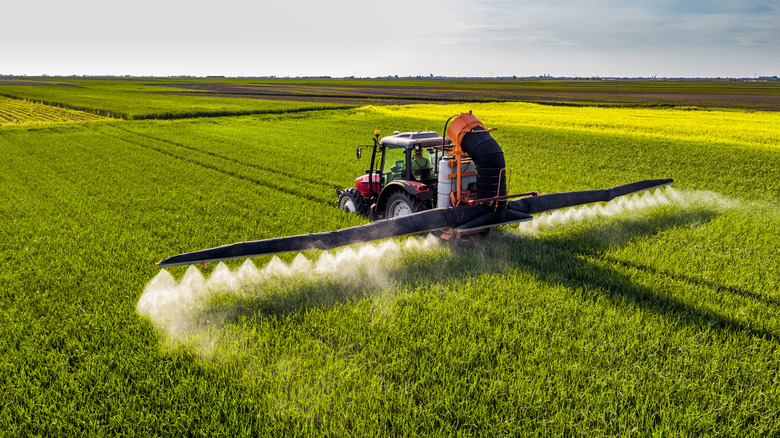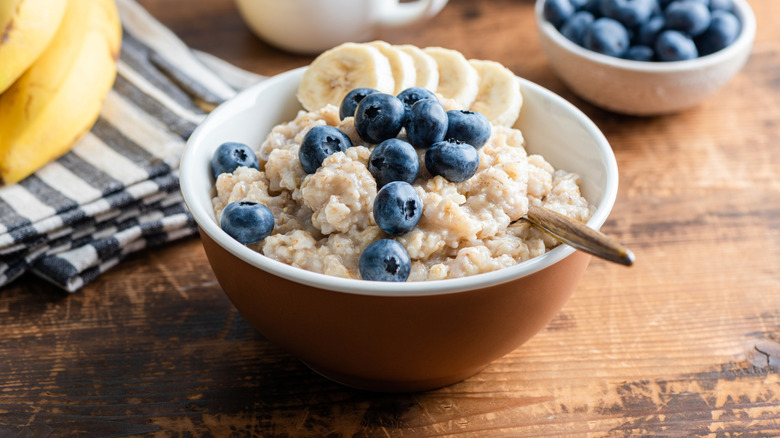The Major Scandal That Will Always Haunt Quaker Oats
Pesticide usage on food crops remains a controversial subject, as many consumers are naturally concerned about how harmful chemicals may impact their well-being. Quaker Oats (along with other oatmeal and cereal brands) has been linked to a possibly hazardous pesticide called chlormequat, which a 1980s study revealed can negatively impact reproduction in pigs and affect fetal development in rats. It's worth noting that, currently, chlormequat can't be used on domestic food crops, but residual amounts of the chemical may be present in some imported items. Additionally, the Environmental Protection Agency (EPA) would like to expand usage so that the pesticide can be directly applied to American-grown crops. While this hasn't yet come to pass, a 2024 study conducted by the Journal of Exposure Science & Environmental Epidemiology found that 90% of urine samples collected in the U.S. in 2023 contained the pesticide.
However, this isn't the first time the popular cereal brand has been involved in controversy. Quaker Oats was subject to a bizarre lawsuit stemming from a scientific research study conducted in the 1940s that entailed feeding radioactive cereal and milk to vulnerable children living in a boys' home. The experiments were only discovered decades later, and Quaker Oats (along with the Massachusetts Institute of Technology) settled the suit for $1.85 million. While Quaker Oats isn't the only brand involved in this more recent controversy, it does belie the brand's reputation as a provider of wholesome, old-fashioned foods.
Why is chlormequat used on crops?
Chlormequat inhibits plant growth hormones, meaning it helps control the size of plants. This is important for smaller crops such as oats and wheat, as a phenomenon known as "lodging" causes plant stems to break or sag. This can cause major issues for harvesting, which is why the EPA wants to begin using the pesticide on food crops in the U.S. The EPA's internal risk assessment procedures show that chlormequat can be safely used on domestic food crops, but the Environmental Working Group (a non-profit environmental advocacy organization) disputes the safety of these chemicals.
As illustrated in a 2023 EWG study regarding chlormequat levels in cereals and other products containing oats, 13 out of the 14 items tested contained the pesticide. Additionally, 11 of the test products "contained chlormequat levels higher than the amount we [EWG] think is safe for children's health." However, it's not clear where Quaker Oats products fall on that scale. Based on these results, EWG has significant concerns about the impact the chemical will have once it's used directly on American-grown food crops.
Organic oats typically lack pesticides like chlormequat
If you want to limit your exposure to chlormequat and other potentially harmful pesticides, organic oat brands might be a better alternative to Quaker Oats and other non-organic cereals. According to the USDA, foods can bear organic labeling if they adhere to strict federal guidelines regarding soil conditions, the use of artificial ingredients, and the application of pesticides — among many other considerations. In the majority of cases, synthetic pesticides can't be used on organic foods, as these chemicals fall into the category of prohibited substances.
Not understanding recommended daily values and falling for misleading marketing are just two of the mistakes everyone makes when trying to read food labels. Similarly, knowing whether an oatmeal brand's organic label is the real deal or just a bit of clever advertising can be puzzling. As a result, consumers should know how to tell whether a food is truly organic based on its label. The USDA uses accredited certifying agents, and these accepted certifiers will be included on organic food labels along with organic seals. When assessing a product label, look for circular green and white seals with "USDA" on the top portion and the word "Organic" on the bottom.


